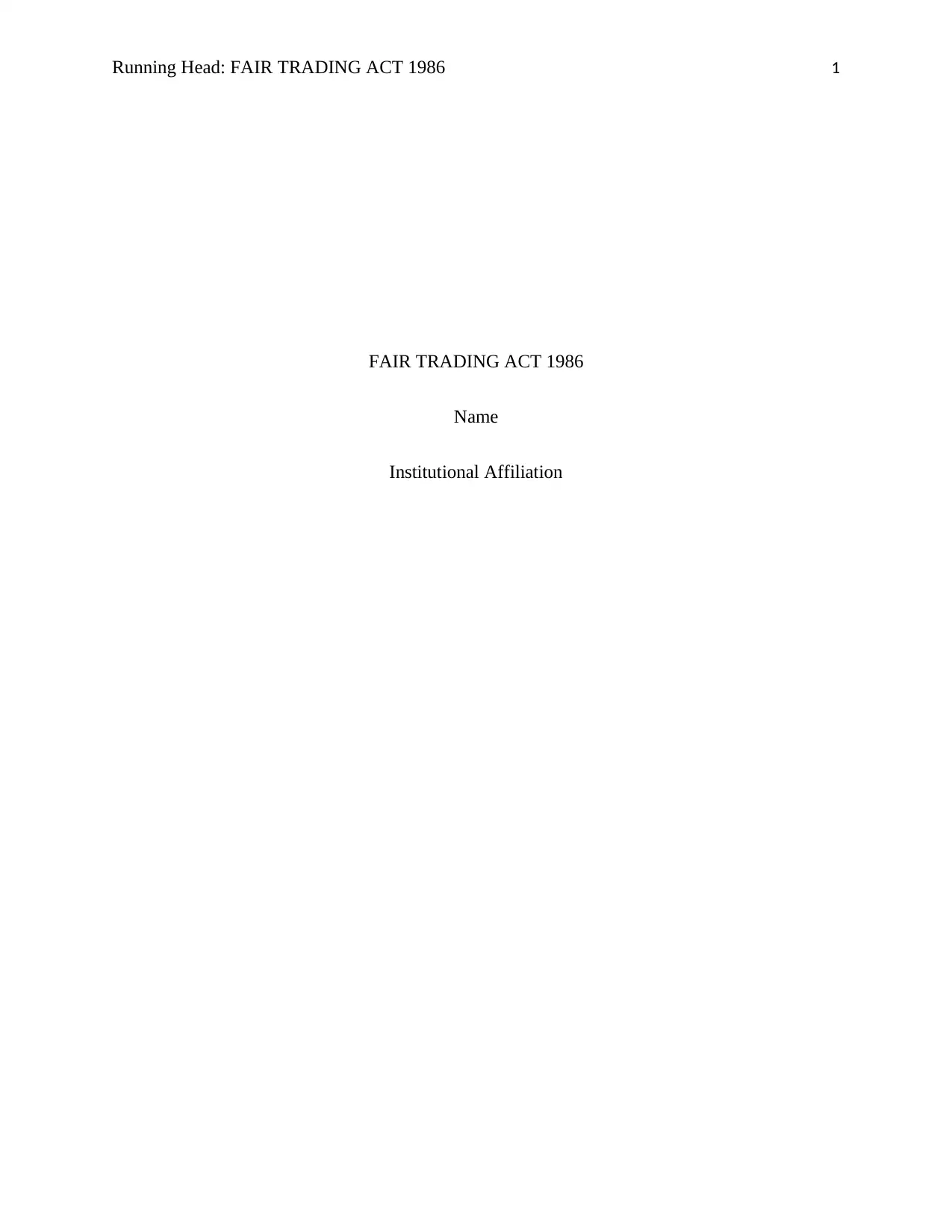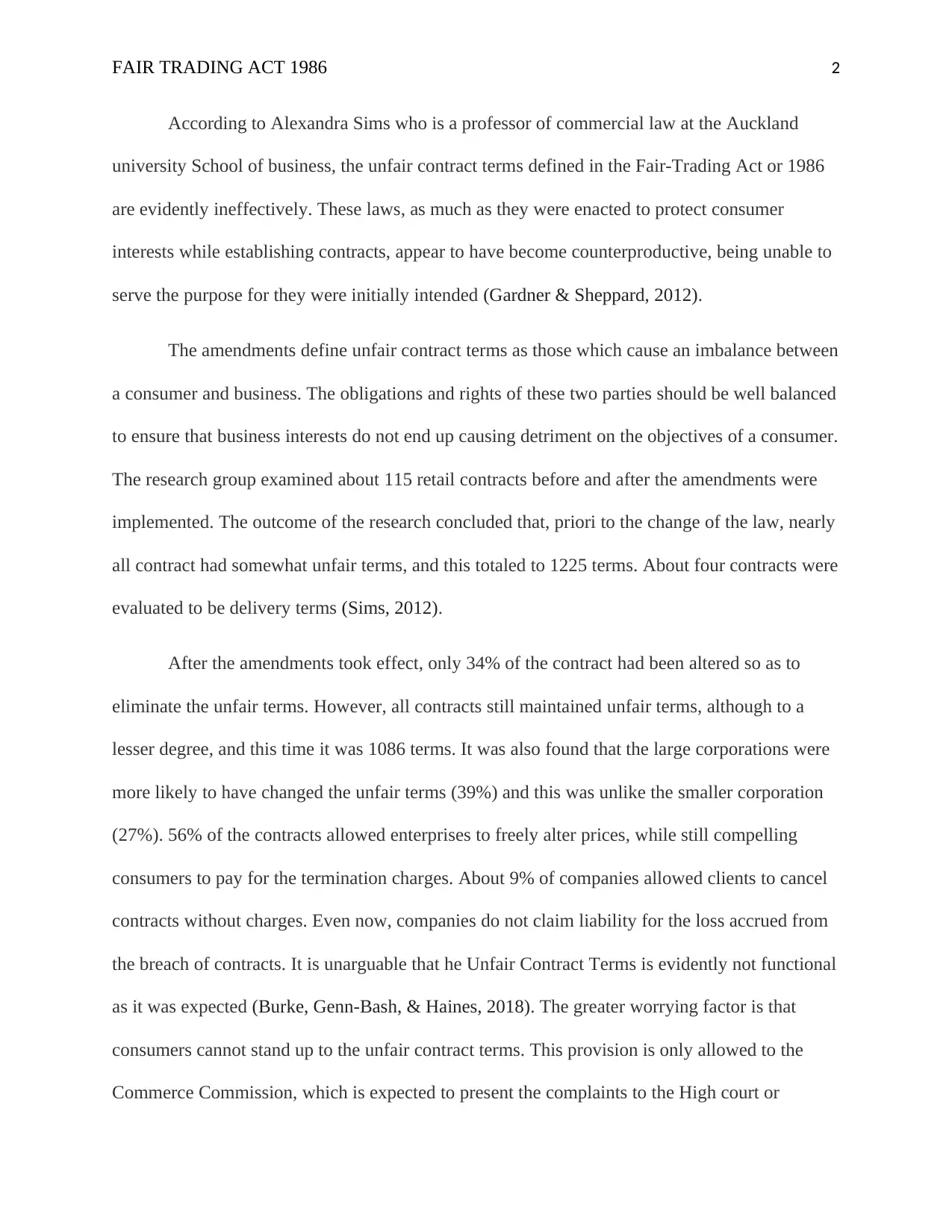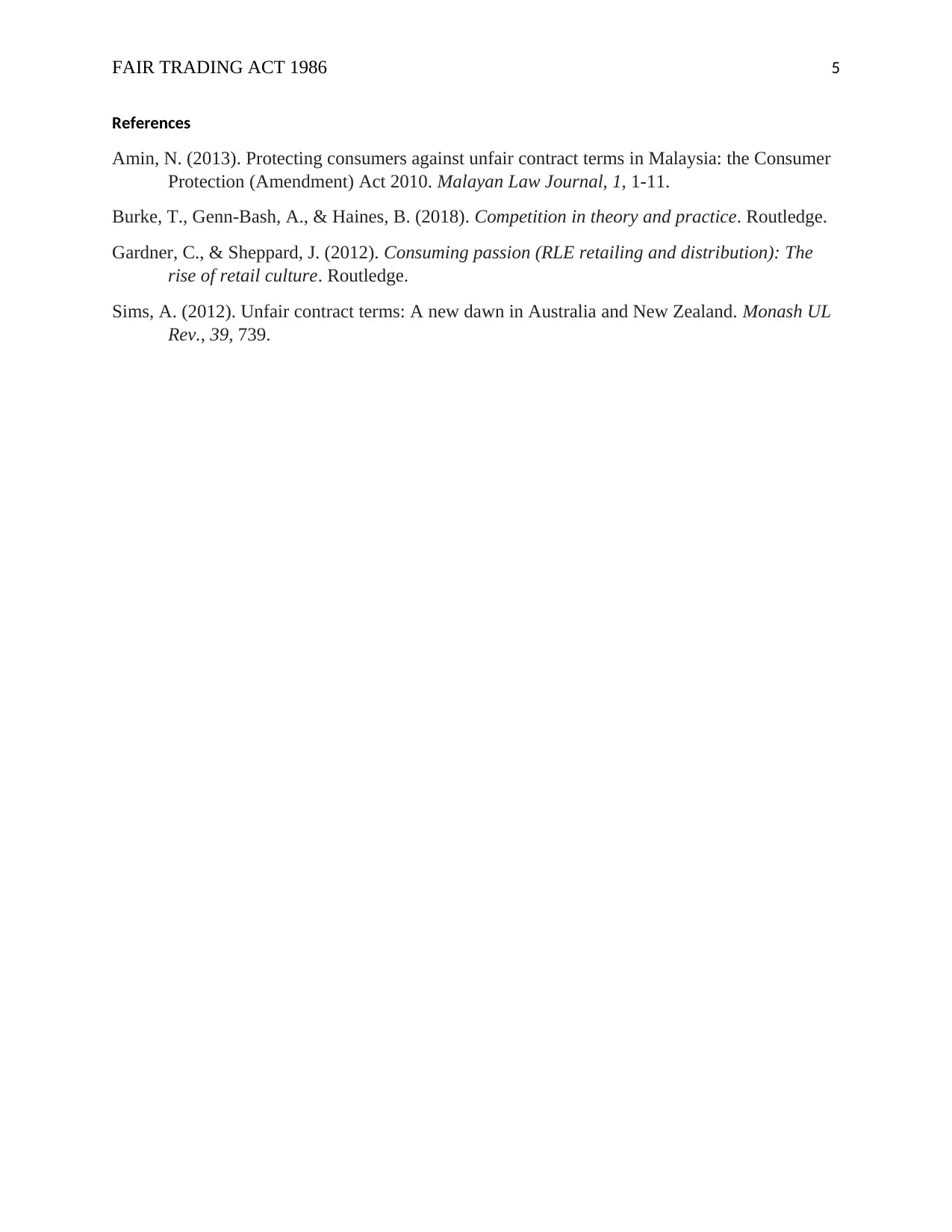The Fair Trading Act 1986: An Evaluation of Consumer Protection
VerifiedAdded on 2022/10/13
|5
|905
|31
Report
AI Summary
This report analyzes the effectiveness of the Fair Trading Act 1986 in New Zealand, focusing on its ability to protect consumers from unfair contract terms. It references the work of Alexandra Sims, highlighting the Act's limitations and the prevalence of unfair terms in retail contracts. The report examines the impact of amendments to the Act, noting that while some improvements were made, many unfair terms persist. It discusses the role of the Commerce Commission and the limitations faced by consumers in seeking redress. The report concludes by considering proposed reforms aimed at strengthening consumer rights, while also cautioning against granting the Commerce Commission excessive enforcement powers. The references include works by Amin, Burke, Gardner, and Sims, providing a comprehensive overview of the topic.

Running Head: FAIR TRADING ACT 1986 1
FAIR TRADING ACT 1986
Name
Institutional Affiliation
FAIR TRADING ACT 1986
Name
Institutional Affiliation
Paraphrase This Document
Need a fresh take? Get an instant paraphrase of this document with our AI Paraphraser

FAIR TRADING ACT 1986 2
According to Alexandra Sims who is a professor of commercial law at the Auckland
university School of business, the unfair contract terms defined in the Fair-Trading Act or 1986
are evidently ineffectively. These laws, as much as they were enacted to protect consumer
interests while establishing contracts, appear to have become counterproductive, being unable to
serve the purpose for they were initially intended (Gardner & Sheppard, 2012).
The amendments define unfair contract terms as those which cause an imbalance between
a consumer and business. The obligations and rights of these two parties should be well balanced
to ensure that business interests do not end up causing detriment on the objectives of a consumer.
The research group examined about 115 retail contracts before and after the amendments were
implemented. The outcome of the research concluded that, priori to the change of the law, nearly
all contract had somewhat unfair terms, and this totaled to 1225 terms. About four contracts were
evaluated to be delivery terms (Sims, 2012).
After the amendments took effect, only 34% of the contract had been altered so as to
eliminate the unfair terms. However, all contracts still maintained unfair terms, although to a
lesser degree, and this time it was 1086 terms. It was also found that the large corporations were
more likely to have changed the unfair terms (39%) and this was unlike the smaller corporation
(27%). 56% of the contracts allowed enterprises to freely alter prices, while still compelling
consumers to pay for the termination charges. About 9% of companies allowed clients to cancel
contracts without charges. Even now, companies do not claim liability for the loss accrued from
the breach of contracts. It is unarguable that he Unfair Contract Terms is evidently not functional
as it was expected (Burke, Genn-Bash, & Haines, 2018). The greater worrying factor is that
consumers cannot stand up to the unfair contract terms. This provision is only allowed to the
Commerce Commission, which is expected to present the complaints to the High court or
According to Alexandra Sims who is a professor of commercial law at the Auckland
university School of business, the unfair contract terms defined in the Fair-Trading Act or 1986
are evidently ineffectively. These laws, as much as they were enacted to protect consumer
interests while establishing contracts, appear to have become counterproductive, being unable to
serve the purpose for they were initially intended (Gardner & Sheppard, 2012).
The amendments define unfair contract terms as those which cause an imbalance between
a consumer and business. The obligations and rights of these two parties should be well balanced
to ensure that business interests do not end up causing detriment on the objectives of a consumer.
The research group examined about 115 retail contracts before and after the amendments were
implemented. The outcome of the research concluded that, priori to the change of the law, nearly
all contract had somewhat unfair terms, and this totaled to 1225 terms. About four contracts were
evaluated to be delivery terms (Sims, 2012).
After the amendments took effect, only 34% of the contract had been altered so as to
eliminate the unfair terms. However, all contracts still maintained unfair terms, although to a
lesser degree, and this time it was 1086 terms. It was also found that the large corporations were
more likely to have changed the unfair terms (39%) and this was unlike the smaller corporation
(27%). 56% of the contracts allowed enterprises to freely alter prices, while still compelling
consumers to pay for the termination charges. About 9% of companies allowed clients to cancel
contracts without charges. Even now, companies do not claim liability for the loss accrued from
the breach of contracts. It is unarguable that he Unfair Contract Terms is evidently not functional
as it was expected (Burke, Genn-Bash, & Haines, 2018). The greater worrying factor is that
consumers cannot stand up to the unfair contract terms. This provision is only allowed to the
Commerce Commission, which is expected to present the complaints to the High court or

FAIR TRADING ACT 1986 3
District court. More so, unless the unfair term in question violates the Consumer Guarantees and
Fair-Trading Act, the tribunals will never enforce the unfair term in favor of the client. This is
because suppliers will argue that the terms which are considered to be unfair, are favorable from
a different point of view and by a different customer.
The Commerce Commission undertook a review of the standard Consumer Contracts as
established within various industries. The research results of the Energy and telecommunication
retailers showed that there is a wide number of unfair terms within contracts. According to Sims,
most of the business are waiting to be pushed so that they can fully implement changes in the
unfair contract’s terms. Being New Zealand’s largest enterprises, they should naturally struggle
to comply with the statutes instead of waiting to be pushed around. The commerce commission
plays an important role as it helps to sensitize consumers about their rights. Additionally, some
consumers tend not to have the will to pursue the violation of their rights by suppliers, and that is
why the commerce commission has placed as gatekeeper to link the courts and consumers
(Amin, 2013).
Conclusion
Proposals in the New Zealand Consumer Law Reform Bill will help in securing
consumer interests. Furthermore, this is indicative of the realization that common contract law
regulations have failed to sufficiently protect consumer’s legal rights. Nonetheless, it is essential
that rules defining unfair terms be broadened as much as possible to include all parameters that
may justify violation of sanctity and consumer freedoms in a contract. As much as the
Commerce Commission is playing a critical role in pushing for the adoption of the new
proposals, there is a risk in giving full powers to the commission to carry out enforcement of
laws. This is because consumers are fully prevented from bringing direct complaints against a
District court. More so, unless the unfair term in question violates the Consumer Guarantees and
Fair-Trading Act, the tribunals will never enforce the unfair term in favor of the client. This is
because suppliers will argue that the terms which are considered to be unfair, are favorable from
a different point of view and by a different customer.
The Commerce Commission undertook a review of the standard Consumer Contracts as
established within various industries. The research results of the Energy and telecommunication
retailers showed that there is a wide number of unfair terms within contracts. According to Sims,
most of the business are waiting to be pushed so that they can fully implement changes in the
unfair contract’s terms. Being New Zealand’s largest enterprises, they should naturally struggle
to comply with the statutes instead of waiting to be pushed around. The commerce commission
plays an important role as it helps to sensitize consumers about their rights. Additionally, some
consumers tend not to have the will to pursue the violation of their rights by suppliers, and that is
why the commerce commission has placed as gatekeeper to link the courts and consumers
(Amin, 2013).
Conclusion
Proposals in the New Zealand Consumer Law Reform Bill will help in securing
consumer interests. Furthermore, this is indicative of the realization that common contract law
regulations have failed to sufficiently protect consumer’s legal rights. Nonetheless, it is essential
that rules defining unfair terms be broadened as much as possible to include all parameters that
may justify violation of sanctity and consumer freedoms in a contract. As much as the
Commerce Commission is playing a critical role in pushing for the adoption of the new
proposals, there is a risk in giving full powers to the commission to carry out enforcement of
laws. This is because consumers are fully prevented from bringing direct complaints against a
⊘ This is a preview!⊘
Do you want full access?
Subscribe today to unlock all pages.

Trusted by 1+ million students worldwide

FAIR TRADING ACT 1986 4
supplier unless they go through the commission. Additionally, it restricts the type of cases that
may be brought to court as, thereby, leaving out some consumers to suffer without any hope for
ever getting justice.
supplier unless they go through the commission. Additionally, it restricts the type of cases that
may be brought to court as, thereby, leaving out some consumers to suffer without any hope for
ever getting justice.
Paraphrase This Document
Need a fresh take? Get an instant paraphrase of this document with our AI Paraphraser

FAIR TRADING ACT 1986 5
References
Amin, N. (2013). Protecting consumers against unfair contract terms in Malaysia: the Consumer
Protection (Amendment) Act 2010. Malayan Law Journal, 1, 1-11.
Burke, T., Genn-Bash, A., & Haines, B. (2018). Competition in theory and practice. Routledge.
Gardner, C., & Sheppard, J. (2012). Consuming passion (RLE retailing and distribution): The
rise of retail culture. Routledge.
Sims, A. (2012). Unfair contract terms: A new dawn in Australia and New Zealand. Monash UL
Rev., 39, 739.
References
Amin, N. (2013). Protecting consumers against unfair contract terms in Malaysia: the Consumer
Protection (Amendment) Act 2010. Malayan Law Journal, 1, 1-11.
Burke, T., Genn-Bash, A., & Haines, B. (2018). Competition in theory and practice. Routledge.
Gardner, C., & Sheppard, J. (2012). Consuming passion (RLE retailing and distribution): The
rise of retail culture. Routledge.
Sims, A. (2012). Unfair contract terms: A new dawn in Australia and New Zealand. Monash UL
Rev., 39, 739.
1 out of 5
Your All-in-One AI-Powered Toolkit for Academic Success.
+13062052269
info@desklib.com
Available 24*7 on WhatsApp / Email
![[object Object]](/_next/static/media/star-bottom.7253800d.svg)
Unlock your academic potential
Copyright © 2020–2026 A2Z Services. All Rights Reserved. Developed and managed by ZUCOL.
